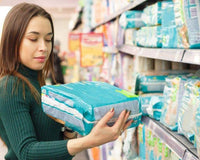Did you know that one in four adults suffers from some form of incontinence? A quarter of the population struggles with involuntary urine or fecal leakage. And while this issue is often viewed as taboo, it's important to remember that incontinence is nothing to be ashamed of - it's a medical condition that can affect anyone at any age.
There are many different causes of incontinence, but luckily there are also many ways to manage it. One of the most popular methods is using adult diapers or incontinence diapers. However, even with diapers, leakage can still be an issue.
If you're dealing with leaks, here are a few tips to help you avoid them:
- Choose the right size diaper - If your diaper is too small, it won't be able to hold all of your urine or feces, leading to leaks. Conversely, if your diaper is too big, it will likely sag and leak. Be sure to choose a size that fits you snugly but comfortably.
- Use the right absorbency - Not all diapers are created equal when it comes to absorbency. If you're dealing with heavy leakage, choose a diaper with a high absorbency rating like Prevail Maximum Absorbency Underwear for Women. Otherwise, you may find yourself dealing with leaks regularly.
- Change your diaper frequently - This one may seem obvious, but it's essential nonetheless. The longer you wear a dirty diaper, the greater the chance of leakage. Be sure to change your diaper immediately after it becomes wet or soiled.
Adult diapers with wetness indicators like Absorb Plus Briefs are also a great way to help avoid leaks. These diapers feature a line that changes color when the diaper is wet, so you'll know it's time to change.
- Avoid constipation - Constipation can put a lot of pressure on your bladder and bowels, leading to leaks. To avoid this, eat a high-fiber diet and drink plenty of fluids. If you're having trouble going to the bathroom, talk to your doctor about taking a laxative.
- Don't wait too long to use the restroom - If you feel the urge to urinate or have a bowel movement, don't wait too long to act on it. The longer you hold it, the greater the chance of an accident.
- Ensure a good fit - A poorly fitting diaper is more likely to leak than one that fits properly. Be sure to adjust the straps on your diaper, so it's snug but not too tight.
- Avoid diuretics - Diuretics can make you urinate more frequently, which can lead to leaks. Caffeine, alcohol, and certain medications are all diuretics, so if you're taking any of these, stay hydrated and take frequent bathroom breaks.
- Choose premium-quality - If you're worried about leakage, premium-quality adult diapers are worth the investment. These diapers are made with higher-quality materials and offer a better fit, which can help to prevent leaks.
The Tranquility Premium OverNight Absorbent Underwear is a great option for those dealing with heavy leakage at night. These diapers feature a super-absorbent core that offers a 16-hour capacity so that you can sleep soundly through the night without worry.
- Use liners and pads- Liners are thin pads that you can place inside your diaper for added protection against leaks. They're especially useful for those dealing with light to moderate incontinence.
Pads are thicker than liners and offer more absorbency. They're a good choice for those with moderate to heavy incontinence. Meddcare's Absorbent Plus Underpads provide maximum absorbency, making them ideal for those with heavy leakage.
Incontinence diapers can be a great way to manage incontinence, but they're not foolproof. If you're still struggling with leaks, talk to your doctor about other treatment options. In the meantime, following these tips can help to reduce the likelihood of accidents.









